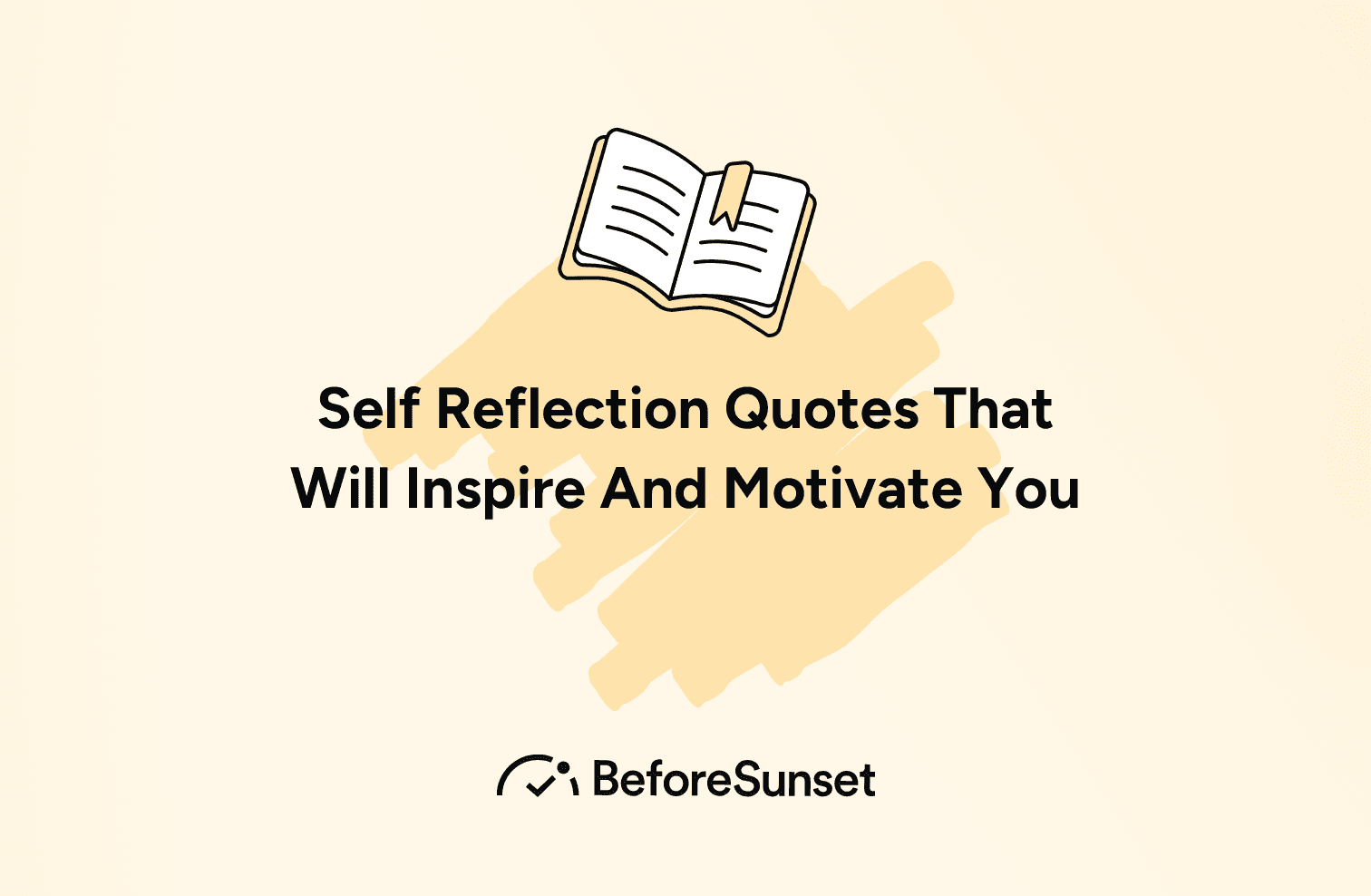Self-reflection serves as a thread of introspection that connects our ideas, feelings, experiences, and goals in the fabric of life. We find the ability to comprehend ourselves more fully, to negotiate the complex labyrinth of our ideas, and to unearth the knowledge that lies within the peaceful chambers of self-contemplation.
The voyage of self-reflection is a process that asks us to pause, reflect, and establish a connection with the core of who we are.
We cordially encourage you to set off on a journey of understanding and inspiration with the help of this collection of "Self-Reflection Quotes That Will Inspire and Motivate You." These sayings act as lights, illuminating the way to introspection's profound art as well as self-awareness and personal development.
They serve as a reminder that our minds contain a wealth of knowledge that is just waiting to be discovered and that every thought is a step toward opening the door to self-discovery.

Types of Self-Reflection
Self-reflection is a profound and transformative practice that invites individuals to delve into the depths of their inner world. It serves as a mirror to our thoughts, emotions, experiences, and actions, offering a unique vantage point from which we can understand ourselves more intimately.
Just as light refracts into a spectrum of colors, the practice of self-reflection reveals the multifaceted nature of our being. However, this introspective journey is not a monolithic process; rather, it can take on various forms, each offering its own insights and benefits.
In this section of "Types of Self-Reflection," we will uncover the diverse ways in which individuals engage in this practice, each type shining a light on different aspects of personal growth, emotional intelligence, and self-awareness.
Reflection Through Writing
Writing about one's reflections is a highly enlightening and therapeutic exercise that helps people to set off on a path of personal improvement. In order to create a concrete record of one's inner world, this technique entails transcribing the intricacy of ideas, feelings, and experiences onto paper or computer screens.
Individuals can develop a better knowledge of themselves and their lives by engaging in this activity, which helps them to untangle the complexities of their thoughts and feelings.
Clarity may emerge from the confusion of thoughts when used as a self-reflection method through writing. You may turn abstract ideas into tangible statements by giving words to your feelings and experiences. In addition to assisting you in making sense of your mental environment, this technique also makes it easier to spot connections and patterns that may otherwise go overlooked.
Writing gives you a perspective from which to examine your experiences objectively, which can lead to insights that can direct your journey toward personal improvement.
Writing about reflection also acts as a reservoir for personal development. You can track your development over time by keeping a journal or reflective diary.
You may observe your development, keep track of your successes, and spot places where you've overcome difficulties as you look back on earlier entries. This record of your trip becomes a symbol of your tenacity and an essential tool for comprehending it.

Reflection Through Conversation
Reflection through conversation is a dynamic and enriching way to engage in self-exploration and personal growth. It involves sharing your thoughts, experiences, and emotions with others in a thoughtful and meaningful manner. Through these dialogues, you can gain new insights, perspectives, and a deeper understanding of yourself and your experiences.
Conversational reflection allows you to:
Receive Different Perspectives: When you discuss your thoughts and experiences with someone else, they can offer unique viewpoints that you might not have considered. This broadens your understanding and can lead to new insights.
Clarify Your Thoughts: Explaining your thoughts and feelings to another person requires you to articulate them clearly. This process of verbalization can help you organize your thoughts and gain clarity on complex matters.
Process Emotions: Engaging in open conversations about your emotions can provide a sense of relief and validation. Sharing your feelings with a compassionate listener can help you navigate challenging emotions.
Practice Active Listening: In conversations, you not only share but also listen. Being an active listener when others reflect on their experiences can help you better understand your own thoughts and feelings through the insights shared by others.
Challenge Assumptions: Conversations often involve asking and answering questions, which can lead to the examination of assumptions and beliefs you might not have otherwise questioned.
Build Empathy: Discussing your experiences with others fosters empathy. As you hear about their perspectives and stories, you develop a deeper understanding of different human experiences.
Strengthen Relationships: Sharing your reflections with friends, family, or mentors can foster deeper connections. Honest conversations promote trust and vulnerability, strengthening your relationships.
Problem-Solve Together: Collaborative conversations can lead to problem-solving. Others might provide suggestions or strategies you hadn't thought of to address the challenges you're facing.
Reflection Through Meditation
Reflection through meditation is a contemplative practice that enables individuals to explore their inner landscape with a calm and focused mind. Unlike traditional meditation practices that often involve emptying the mind, reflective meditation encourages the intentional examination of thoughts, feelings, and experiences.
Through this practice, individuals gain insight into the workings of their minds and develop a deeper connection with their inner selves.
Meditative reflection involves several key aspects:
Focused Awareness: During reflective meditation, individuals direct their attention to a specific thought, question, emotion, or experience. This focused awareness creates a mental space in which to explore these aspects more deeply.
Observation Without Judgment: Instead of reacting to thoughts or emotions, meditative reflection emphasizes observing them without judgment. This allows individuals to cultivate a non-reactive and compassionate stance toward their inner experiences.
Stillness and Presence: Reflective meditation often takes place in a quiet and calm environment. This stillness provides the space to be fully present with thoughts and emotions, allowing for a more profound understanding.
Exploration and Inquiry: Through meditation, individuals gently inquire into their thoughts and emotions. This process encourages self-inquiry, where questions like "Why do I feel this way?" or "What is the root of this thought?" guide the exploration.
Acceptance: Reflective meditation encourages accepting whatever arises during the practice, whether it's positive or challenging. This acceptance fosters a sense of self-compassion and openness to one's experiences.
Integration: The insights gained during reflective meditation can be integrated into daily life. As individuals better understand their thought patterns and emotional responses, they can make more conscious choices in their actions and interactions.

Quotes on Self-Reflection
"Self-reflection is the school of wisdom." - Baltasar Gracián
"The journey into self-love and self-acceptance must begin with self-examination... until you take the journey of self-reflection, it is almost impossible to grow or learn in life." - Iyanla Vanzant
"The unexamined life is not worth living." - Socrates
"Knowing yourself is the beginning of all wisdom." - Aristotle
"In the process of letting go you will lose many things from the past, but you will find yourself." - Deepak Chopra
"The only journey is the journey within." - Rainer Maria Rilke
"We do not learn from experience... we learn from reflecting on experience." - John Dewey
"Self-reflection is a mirror in which we can see our own hearts." - A. B. Simpson
"Spend time with yourself. Reflect upon what you really want in life." - Alison Stormwolf
"Self-reflection is the gateway to freedom." - Unknown
"It's the oldest story in the world. One day you're seventeen and planning for someday, and then quietly and without you ever really noticing, someday is today, and that someday is yesterday, and this is your life." - Nathan Scott
"Without deep reflection, one knows from daily life that one exists for other people." - Albert Einstein
"Self-reflection is the secret of introspection, and introspection is the gateway to wisdom." - Richelle E. Goodrich
"You must take personal responsibility. You cannot change the circumstances, the seasons, or the wind, but you can change yourself. That is something you have charge of." - Jim Rohn
"The greatest thing in the world is to know how to belong to oneself." - Michel de Montaigne
The Power of Self-Reflection Quotes in Psychology
Self-reflection is a huge reality that many of us tend to overlook, often due to being reality blind. Engaging in honest self-reflection can be a humbling process that requires quiet reflection and a willingness to confront our deepest truths. As Baltasar Gracian wisely noted, “Self-reflection is the school of wisdom,” highlighting the importance of this practice in our journey towards understanding and personal growth.
Taking time for solitude can be one of the most powerful tools for cultivating a meaningful life. Carl Jung emphasized the significance of moments of solitude for achieving true nobility and honest self-reflection.
Through direct reflection and mastering the art of reflection, we can gain a deeper understanding of life and our personal values.
Here are a few inspirational quotes that emphasize the importance of self-reflection:
Mark Twain: “Whenever you find yourself on the side of the majority, it is time to pause and reflect.”
These quotes about reflection serve as warning indicators of our potential shortfall of fear and ignorance. They remind us to engage in personal reflection and revisit our core values. A collection of quotes can provide reflection with meaning, offering insights that resonate on a deeper level.
Self-reflection is not about hitting the snooze button on our thoughts; it's about meditative self-reflection that leaves a lasting impression. It can help us overcome the fence of indecision and prepare us for the cold winds of reality.
Learning from art history and the visionary works of Alex Grey, we see the process of creation and the message of togetherness in our reflections.
Incorporating self-reflection into our daily routine can uncover our deepest secrets and lead to true unity and honest self-understanding. Remember, the path to the key to happiness and the key to success lies in continuous self-examination.
Here’s how you can integrate self-reflection into your life:
Set aside time for reflection daily, making it a non-negotiable part of your routine.
Self-reflection is a never-ending process that deepens our personal awareness and enhances the quality of life. It helps us navigate the chaos of life, learn from life experiences, and resolve unresolved issues.
By embracing reflection in water, we can see the reflection of people and our social life, ultimately leading to proper reflection and positive quotes that inspire us.
As we explore quotes about reflection, we find wisdom in the words of others and realize that reflection without learning is futile. The true unity of mind and soul comes from understanding our personal values and striving for continuous growth.
This life to life journey is marked by honest self-understanding and the wisdom we gain from insightful quotes that resonate with our life experiences.
Reflect On Your Tasks With BeforeSunset AI
Did you know that you can see analytics and reflect on your tasks? Now you do. BeforeSunset AI is a powerful tool designed to help you gain insights into your daily activities, enhancing productivity and personal growth.
This innovative platform not only tracks your tasks but also provides detailed analytics that allow for deeper reflection and better decision-making.
By using BeforeSunset AI, you can:
Track your tasks: Keep a detailed log of what you’ve accomplished each day.
Analyze your productivity: Get insights into how efficiently you’re working and identify areas for improvement.
Reflect on your progress: Use the analytics to reflect on your achievements and set goals for the future.
Enhance your daily routine: Integrate reflection and analysis into your daily routine to continuously improve your workflow.
Reflection is a key component of personal and professional development. With BeforeSunset AI, you have the tools to not only complete tasks but also to understand and optimize the way you work. By taking a moment to reflect on your tasks with the help of BeforeSunset AI, you can unlock new levels of productivity and fulfillment.


